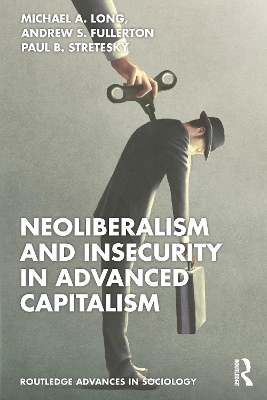Routledge Advances in Sociology
1 total work
Neoliberalism and Insecurity in Advanced Capitalism
by Michael A Long, Andrew S. Fullerton, and Paul B. Stretesky
This book examines the relationship between neoliberalism and insecurity beginning with the post-World War II period and continuing up through the present. Neoliberalism – the dominant political economic perspective which elevates competition above all else at both the structural and individual levels – has increased the amount of insecurity (e.g., food, energy, job) across the world. It provides a theoretical and empirical analysis of how and why neoliberalism and insecurity have become intertwined over the last half century.
The book takes a novel approach to the study of neoliberalism, insecurity, and their intersection. First, in addition to examining specific types of insecurity, the overall concept of insecurity is defined and theorized as a fundamental part of neoliberal capitalism. Second, to help bypass the structural vs. individual binary that has come to characterize much of the neoliberalism literature, a field-theoretic framework heavily influenced by the work of Pierre Bourdieu, is employed.
As such, it will be of great interest for researchers in neoliberalism, insecurity, and Bourdieu’s theory of practice – including advanced undergraduate students and graduate scholars from sociology, anthropology, geography, political science, and public health.
